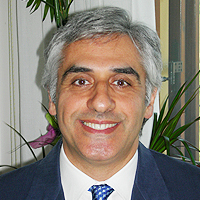Hyperparathyroidism in celiac disease: A case study from UAE
Published on: 7th April, 2020
OCLC Number/Unique Identifier: 9272401475
Celiac disease affects 1% of the world population; however it is under diagnosed in UAE. The disease has many clinical manifestations, ranging from severe malabsorption to minimally symptomatic or non-symptomatic presentation. Hypocalcaemia is a common finding in celiac disease and could be the only presentation of the disease; however hypercalcemia has been previously reported in patients with celiac disease either due to primary hyperparathyroidism or tertiary hyperparathyroidism due to prolonged hypocalcaemia. A normal calcium level on the other hand in patients with untreated celiac disease who also have primary hyperparathyroidism can be due to interplay of these two conditions and may delay the diagnosis of primary Hyperparathyroidism. We report the very first case from our practice in UAE with untreated celiac disease and normal calcium level at presentation, where a diagnosis of primary hyperparathyroidism was not entertained initially. Patient went on gluten free diet which then caused normalization of intestinal abnormalities and likely calcium absorption manifesting as hypercalcemia on subsequent labs. This led to further work up and finally the diagnosis of Primary hyperparathyroidism due to parathyroid adenoma.
Transglutaminase inhibition: possible therapeutic mechanisms to protect cells from death in neurological disorders
Published on: 25th July, 2017
OCLC Number/Unique Identifier: 7317595344
Transglutaminases are a family of Ca2+-dependent enzymes which catalyze post-translational modifications of proteins. The main activity of these enzymes is the cross-linking of glutaminyl residues of a protein/peptide substrate to lysyl residues of a protein/peptide co-substrate. In addition to lysyl residues, other second nucleophilic co-substrates may include monoamines or polyamines (to form mono-or bi-substituted/crosslinked adducts) or -OH groups (to form ester linkages). In absence of co-substrates, the nucleophile may be water, resulting in the net deamidation of the glutaminyl residue. Transglutaminase activity has been suggested to be involved in molecular mechanisms responsible for both physiological and pathological processes. In particular, transglutaminase activity has been shown to be responsible for human autoimmune diseases, and Celiac Disease is just one of them. Interestingly, neurodegenerative diseases, such as Alzheimer’s disease, Parkinson’s disease, supranuclear palsy, Huntington’s disease and other polyglutamine diseases, are characterized in part by aberrant cerebral transglutaminase activity and by increased cross-linked proteins in affected brains. Here we describe the possible molecular mechanisms by which these enzymes could be responsible for such diseases and the possible use of transglutaminase inhibitors for patients with diseases characterized by aberrant transglutaminase activity.
Celiac disease presenting as transient intussusception in two 3-year-olds
Published on: 21st June, 2023
Although intussusception occurs in children and adults with celiac disease, it is a relatively uncommon symptom. Even more rare is the occurrence of intussusception as the presenting symptom of the disease. In the two cases we report here, transient intussusception, occurring at three years of age, was the first and only physical sign of celiac disease, and lead to a timely diagnosis by immunoserology and histology, followed by implementation of a gluten-free diet before sequelae such as significant anemia or Failure to Thrive (FTT) developed. In both cases, neither immunoserological nor physical signs of disease were present at the follow-up examination after 6 months on a gluten-free diet. In addition, genetic screening of the patients’ families revealed HLA-DQ2 positivity in two cases, leading to the additional diagnosis of celiac disease in the pregnant mother of one of the patients.
Celiac disease in a teenager revealed with Wernicke Encephalopathy
Published on: 27th December, 2023
Background: Wernicke encephalopathy is an acute neurological condition defined by a clinical triad of ophthalmoplegia, ataxia, and confusion. This disease is due to thiamine deficiency.Case presentation: After persistent diarrhea and vomiting, a 15-year-old boy presented up-beating nystagmus, with binocular vertical diplopia and unstable gait. An etiological workup revealed a celiac disease. Magnetic resonance imaging showed bilateral periaqueductal region lesions. Treatment and discussion: Because of suspected Wernicke’s encephalopathy, the patient was treated with thiamine replacement and significant improvement of symptoms took place. Wernicke encephalopathy is a serious medical disorder with enormous morbidity and mortality. Evaluation should include patient history with a physical and ophthalmologic examination and laboratory workup with appropriate imaging.Conclusion: Undiagnosed celiac disease can lead to malabsorption of vitamin B1 causing acute symptoms of Wernicke encephalopathy.




